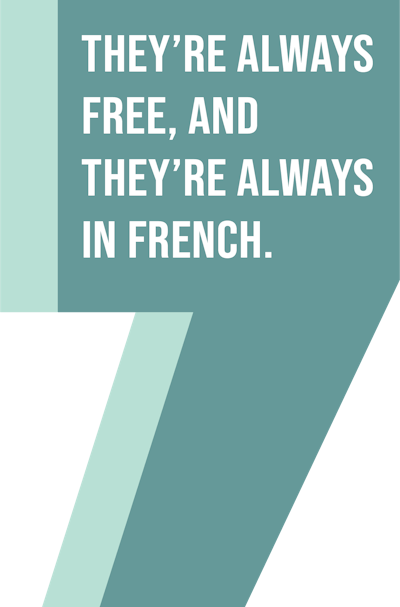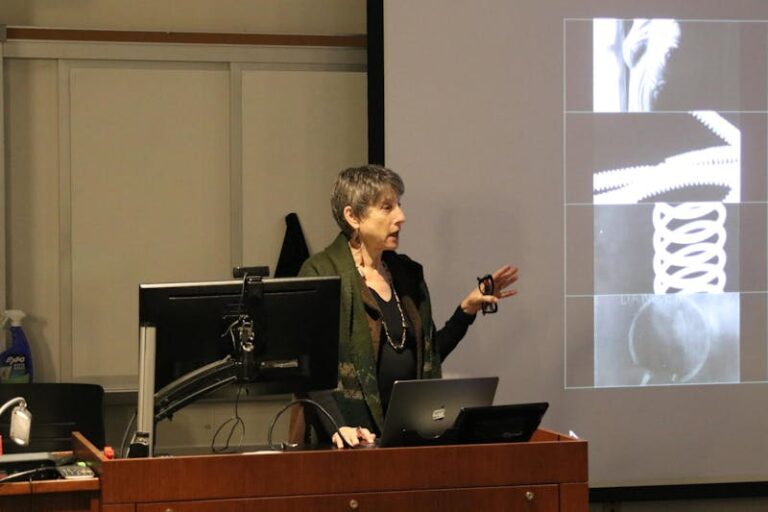Cinécola, a French film festival hosted by USC since 2008, is back on campus, giving the public the opportunity to view films that are not from the United States.
Six screenings, varying from black-and-white silent films to documentaries, are being shown this year, all of which follow this year’s theme: “Locations & Relations.” This theme emphasizes the importance of setting, ranging from 20th-century cities to military bases to rainforests.
USC French professor Ashley Williard is a new member of the Cinécola organizing committee and said she enjoys seeing how the festival gathers the community.
“We rarely come together to watch movies anymore,” Williard said. “It’s so often on a small screen and in a small room by ourselves … That’s a big part of one of my goals for (Cinécola) is to connect through these movies.”
Cinécola is a part of an initiative through the cultural services of the French Embassy. Members of Cinécola’s organizing committee put together a proposal to support the official screening of the films on campus. This means the distributors get paid like they would if the films were being shown in an actual movie theater.
Williard’s role on the committee includes reserving rooms for the screenings, making posters, identifying people to go on panels and coordinating thematic events around certain films, such as the cheese tasting reception that went along with the screening of “Vingt Dieux.”
“It’s been a big job,” Williard said. “All the little details of getting rooms reserved and reaching out to people because … lots of people like to watch movies.”
Williard said her favorite part of helping to organize Cinécola is the actual screenings themselves, because it’s gratifying for her to see people come together for the festival.
“It really brings that kind of global perspective but through very human stories and through an artful form,” she said.
Jeff Persels, another USC French professor, has been working on the organizing committee for Cinécola for almost 20 years. He said the festival has had a great impact.
“It’s been great to see the students want to get out,” Persels said. “They want these films to be in French, and they want to have a chance to practice, to hear and talk about these things.”
Cinécola helped Persels see certain French films that he probably wouldn’t see without the festival, because it’s been hard to get access to them, especially before streaming services, he said.
The festival shows a wide range of French films, whether it is a documentary, comedy or drama. Persels said that giving people across campus the chance to watch movies outside of the United States gets them to think differently and broaden their notion of how to live besides their own.
“Outside, we forget any culture, forget how … focused they can be on one way of doing things or a few ways of doing things,” Persels said. “This way, you say, ‘Wow, people see the world differently.’”
Babila Samuel, a comparative literature graduate student at USC, was a panelist for the discussion on “Dahomey” and said it is important for events such as Cinécola to happen.
“First, it creates communities of thought, and second, it is hosted by the French program,” Samuel said. “It kind of helped to promote both the language and the culture and to also have fun.”
Samuel said it is important to step out of the range of Hollywood films and films from the United States to become more aware of other cultures and other people.

But for Cinécola, watching the screenings is not the only way to gain new insights about cultures and foreign films. Some of the screenings are accompanied by panels for attendees to listen to discussions done by USC professors and graduate students and also to have the chance to ask questions of their own.
“Listening to discussions, like the one we just had, and participating in them, gives this awareness of the difference of knowledge that is not distributed,” Samuel said. “Most of the things we talked about, everyone does not have access to.”
Numerous different topics were talked about during the “Dahomey” discussion, such as African identity and the loss of African culture through French colonization.
All of the events are free to the public, and each screening has subtitles in English. Three screenings remain: “Île rouge” on Nov. 4, “Soundtrack to a Coup d’état” on Nov. 12 and “Flow” on Nov. 16.
“They’re always free, and they’re always in French,” Persels said. “So that’s our motto: ‘Free and in French.’”
[ad_1]
Images are for reference only.Images and contents gathered automatic from google or 3rd party sources.All rights on the images and contents are with their legal original owners.
[ad_2]

